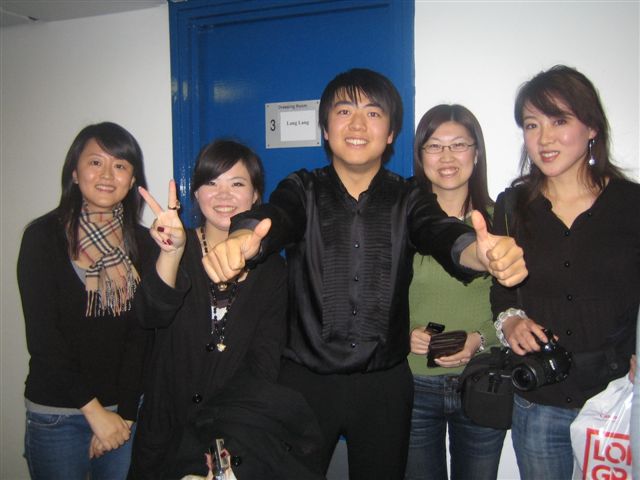| Lang Lang |

|

|

|
| Features | |||||||||||||||||||||||||||||||||||||||||||||||||||||||||||||||||||||
| Wednesday, 22 April 2009 | |||||||||||||||||||||||||||||||||||||||||||||||||||||||||||||||||||||
|
For several precious seconds, the girls crowd round the door labelled, ‘Dressing Room: Lang Lang’ - too excited to execute their next course of action. On the purely practical basis that someone needs to do it, I knock timidly on the door. My expectation is to be greeted by a menacing, muscled minder. Lang Lang opens the door. Maybe it is my febrile imagination, but the smile that lights up his handsome face holds us in thrall. He is first to speak – in Chinese - at the same time the girls – now woken from their trance – trill in unison. “Hi, how are you? Where’re you from? Beijing? Really? Cool! Did you like the concert? Great to see you!” He is tall, with sleek black bangs that fall rebelliously over his forehead, and riveting pearl-round eyes that lock yours into attention. Lang Lang is wearing a loose, black silk shirt; during his stage appearance earlier, he had tugged a few times at the collar of the glitzy shirt he had worn. There is no trace of any stress he might have experienced during his performance of Michael Tippett’s Piano Concerto with the London Symphony Orchestra, conducted by Sir Colin Davis at the Barbican Hall, London. It is a staggering testament to Lang Lang’s enormous popularity that the Hall was filled to capacity, and around a third of its audience was Chinese. Lang Lang’s performance drew four encores and a standing ovation from the rapturous crowd. “Please, please, a picture with you, Lang Lang!” the girls beg. We have a total of three cameras and much fanciful wishing between us. Lang Lang has a warm and easy manner and seems as thrilled to meet us as we are to be in his presence. He obliges, grinning with obvious relish and sticking up two triumphant thumbs as the cameras click. The girls are giddy with so much attention from Lang Lang. This is hardly surprising given that Lang Lang is a dazzling pianist who has garnered serious international critical acclaim, an award-laden musician who has performed with some of the world’s most renowned conductors and orchestras, a child prodigy aged six when he had won the Shenyang Piano Competition, and a young man with rock star status around the globe but particularly in China. We exchange some anecdotes before we are interrupted by a lean man in a dark suit standing inside the dressing room. He beckons at Lang Lang with a slight nod of his head. Lang Lang says apologetically to us, “I’m so sorry. I have to go. Thanks for coming!” He smiles, gives a final wave, enters the dressing room and closes the door. The girls’ eyes are moist with regret and happiness. “He’s so passionate!” one of them whispers. Two of the girls – a pianist and a violinist – agree. “Lang Lang is one of the greatest piano players in the world. As we are all Chinese, we are very proud of him. His performance was fantastic!” A few weeks earlier, Lang Lang had agreed to an exclusive email interview with me, his frenetic schedule precluding the preferable face-to-face interview. Lang Lang’s response is largely un-edited. WYR: You have performed in some of the most famous public spaces in the world, seating many thousands – Royal Albert Hall in London, Carnegie Hall in New York and the Great Hall of the People in Beijing - to name just three. Some would say that piano music is an intimate form of communication between player and listener and such venues distract. Yet, clearly, music in general or that specifically created for piano, has always allowed for the exhibition of the many characteristics of a piece - whether poetic, exciting, quiet or tragic. What is your view on the apparent contradictory or complementary aspects of where piano performances should take place? Do you, for example, perform in as many smaller venues – capacity less than 50 – as the larger ones? What are the differences, if any? As a professional pianist, 95% of my concerts are in the best music halls around the globe. The other 5-10% are educational events in small settings. I prefer the large music halls because in the smaller settings the sound can only project so far. WYR: You will be performing the following at Manchester. Frederic Chopin’s Polonaise No. 6 in A-flat, the Héroique, composed in the 1820s, remains immensely popular with performers and audiences alike around the world. This is the case too, with Franz Schubert’s music. Each of Claude Debussy’s Preludes is separately sensual and explosive. In comparison, Béla Bartók’s creations are contemporary. Are there differences in the way you prepare for each of the different composers’ pieces – technically and emotionally? WYR: In each case, what is your earliest memory of it? Why do you perform it? LL: Bartók is very new for me because after I started playing his piano concerto no. 2 I feel in love with Bartók, the rhythm, the phrasing, the Hungarian style and the contemporary concept really interested and excited me. Schubert is the first sonata I learned in the past. It is one of the most major works by Schubert and I think it’s a real masterpiece with every precise detail in the lyrical passages and with the Austrian lightness of approaching music. It’s a fascinating piece for me to learn. Debussy – I knew this piece before as well, I starting playing A Girl With Red Hair, when I was a kid so I always loved the melody and the French fusion because it’s also inspired from the East. I always call Debussy the French Fusion impressionist. WYR: You were three years old when you began formal piano studies with Professor Zhu Ya-Fen from the Shenyang Conservatory of Music, and nine years old when you entered the Central Music Conservatory in Beijing, studying under Professor Zhao Ping-Guo. How did you find the regime in both cases? WYR: During that period, when you were not playing or listening music, how did you spend your time?
LL: Studying school work. WYR: Who were your friends?
LL: Classmates and music friends and neighbours. WYR: Some people consider that three years, even nine years, is too tender an age to be focusing so much time and energy on the pursuit of music, no matter how obviously talented the child, however much the child loves music. What is your view? WYR: Leaving aside music critics, you have a huge international following of people who simply love listening to the music you play. How do you keep in touch with your fans? How do you react to criticism (if any) of your performance/s? WYR: Apart from winning scores of awards, you have performed to critical acclaim some of the world’s most beautiful, virtuosic pieces ever composed, with some of the greatest orchestras in the world conducted by internationally famous conductors, in many landmark public spaces. You are only 25 years old. What would you like to have achieved by the time you are 35 years old?
LL: A lot. Mostly more education work helping young children to understand classical music and helping pianists and musicians to enjoy more the process of practising and studying. WYR: Have you ever completed in public a piece and not been thoroughly satisfied with it? If yes, can you share your feelings on this and what action, if any, it triggered?
LL: I’m working hard to play my best in every concert, sometimes I don’t feel I achieved everything I wanted but from now I still have a certain standard. But obviously there are many things I can work on to improve myself. WYR: You were born in Shenyang, China, and studied music in Beijing and Philadelphia, USA. You also have close links with Germany through your association with Christoph Eschenbach – pianist and one of today’s leading conductors. Where is home? And why? How do you relax? More information about Lang Lang’s performances at www.barbican.org.uk See also http://www.guardian.co.uk/music/2009/apr/17/tan-dun-lang-lang-collaboration Words and pictures by Wah-Yin Rixon April 2009
|
|||||||||||||||||||||||||||||||||||||||||||||||||||||||||||||||||||||






 A gaggle of girls in tight faded jeans and layered tops – long, black silky hair draped over their willowy figures – push through the Artists’ Entrance. I follow surreptitiously, feeling and looking out of place.
A gaggle of girls in tight faded jeans and layered tops – long, black silky hair draped over their willowy figures – push through the Artists’ Entrance. I follow surreptitiously, feeling and looking out of place. 
